
In 1913, a small, up-and-coming school came to West Point to challenge the great Army football team. The opposing quarterback dropped back, raised the football, and threw a perfect spiral to his wide open teammate. Again and again the quarterback and his receiver completed passes, resulting in a stunning 35-13 defeat of Army. That school was Notre Dame and the receiver was Knute Rockne: the game of football was transformed. The story of Notre Dame’s passing attack goes back seven years, when the forward pass was first legalized as a means of opening the game up to avoid the fatalities that plagued early football and nearly saw the game banned. A student of the legendary Amos Alonzo Stagg, Jesse Harper, envisioned a mixture of precision passing and running throughout the game, and after arriving at Notre Dame, he schooled his team in his new-fangled approach.
In Forward Pass: The Play That Saved Football, Philip L. Brooks introduces the reader to the dirt, spectacle, and emotion of the great teams of the early twentieth century, including Jim Thorpe and the Carlisle Indians, Stagg’s University of Chicago Maroons, Fielding Yost’s Michigan Wolverines, Johnny Heisman’s Georgia Tech Yellow Jackets, and Gil Dobie’s Washington Huskies. While most teams experimented with passing, it was Jesse Harper and Knute Rockne who showed how the forward pass could be used as the ultimate offensive strategy and key to the brilliant future of football.
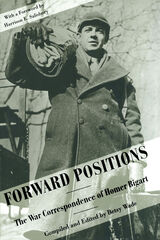
Among journalists—and particularly war correspondents—Homer Bigart was both legend and example. In a career of four decades, first with the New York Herald Tribuneand then, through 1972, with The New York Times, Bigart distinguished himself as a superb writer and tireless digger for the realities that could be learned only in the field and not at headquarters. In 1943 Bigart sailed for England to cover the air war and was soon on mule-back in Sicily, and hanging on at Anzio. He then went to the Pacific, where his dispatches won him his first Pulitzer Prize for foreign correspondence. When hostilities erupted in Korea he was again on the front lines in the front lines in the Orient, and again recipient of a Pulitzer. By the time of the American involvement in Vietnam, he was an old-timer, a seasoned correspondent admired and celebrated for his wit but regarded with awe for his masterly stories, in which straightforward prose, informed by tenacious reporting, cut to the heart of the issues.
Previously available only n crumbling library copies of the Tribune and the Times, or in microfilm repositories, his dispatches, with their rare insights into warefar and he minds of those who wage war, are now collected in Forward Positions: The War Correspondence of Home Bigart, edited by Betsy Wade and introduced by Harrison E. Salisbury, himself the winner of a Pulitzer Prize for journalism.
Forward Positions does honor to a breed of journalist that had passed into history by the time of Bigart’s death. It includes one of the first accounts of the atomic annihilation of Hiroshima, a report on the war-crimes trial of Adolf Eichmann, a number of dispatches on “hot” battles of the Cold War, and a probing dispatch on Lieutenant William Calley’s testimony on the Mỹ Lai Massacre. With this representative selection of more than fifty of Bigart’s accounts of war on the ground, in the air, and in the courtroom, Wade provides a wealth of background material about his career, as well as glimpses of his impact on journalism. The book promises hours of captivating and informative reading for journalists, historians, veterans, and anyone who likes a good story tautly told.
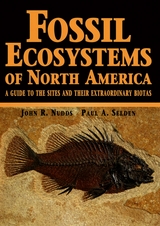
Fossil Ecosystems of North America describes these and eleven other sites that range across the continent.

Fossil Invertebrates introduces readers to the biosphere as it was hundreds of millions of years ago, when seas teemed with animal forms both familiar and strange: ammonites and corals, mollusks and sponges, crinoids and trilobites. On land, terrestrial forms were beginning to make their mark, leaving behind traces such as burrows and track ways and other fossil evidence of the important transition to life on land. The plates in this book capture the incredibly detailed impressions and casts of ancient life, contrasting them with forms, such as the horseshoe crab and the chambered nautilus, that persist today virtually unchanged.
The shells and hard exoskeletons of invertebrates make them excellent candidates for fossilization, and the amateur fossil collectors are more likely to uncover an invertebrate fossil than any other kind. The fossilized remains of invertebrates dominate university collections and museum holdings worldwide and their study continues to yield important insights into the nature of evolutionary change and the impact of climate change on biodiversity, as great explosions of diversity were succeeded by mass extinctions. Paul D. Taylor and David N. Lewis, both of the Natural History Museum, London, have written a comprehensive and accessible resource, one that provides undergraduates and amateur fossil enthusiasts with a means to understand and interpret this rich fossil record.

The only comprehensive description of the fossil-vertebrate content of this important part of the world.

"Taphonomy is plainly here to stay, and this book makes a first class introduction to its range and appeal."—Anthony Smith, Interdisciplinary Science Reviews

Fossils, far from being mere dry bones, provide the key to understanding the stuff of history: past climates, evolution, and extinction. In this lively introduction, Richard Fortey offers an engaging and lucid explanation of how fossils are a product of our endlessly evolving habitat. The story begins with the Precambrian era, more than 600 million years ago. As Fortey traces the history of life from the dawn of the Precambrian to the present, he paints a vivid picture of the emergence of the plants and animals that we would recognize today. Unlike so many works on fossils that focus on dinosaurs, this book covers a broad range of animals and plants and does justice to the numerical superiority of invertebrate fossils.
The scope of the book is wide, including not only a history of paleontology but a review of those parts of general geology that are needed to appreciate the wealth of information contained in the fossil record: stratigraphy, measurements of paleotemperatures and radiometric ages, turbidites, reefs, sandstones, and so on. But the main emphasis of the book is on what paleontology is really about, how the paleontologist tries to figure out the ways in which fossil animals lived, and how geological processes such as plate tectonics have interacted with the history of life.
Fossils attempts to survey the contemporary paleontological scene in order to communicate the excitement of investigating the past. A primary goal of the book is to inspire and instruct the amateur fossil collector; hence, the specimens illustrated—many of which are presented in full color—are ones that are not too difficult for the amateur to collect. To aid the neophyte, the author has appended notes on the occurrence, significance, and preparation of each specimen. Of particular interest to the amateur are the discussions on how to collect fossils and on the economic and practical importance of fossils and their enclosing sediments. In striking a perfect balance between detail and generalization, Richard Fortey has written a book that will appeal to amateur and professional alike.
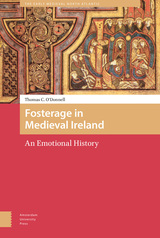
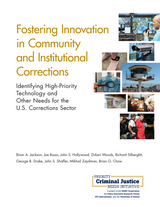
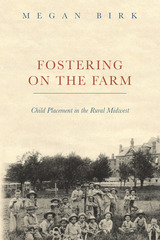
Drawing on institution records, correspondence from children and placement families, and state reports, Megan Birk scrutinizes how the farm system developed--and how the children involved may have become some of America's last indentured laborers. Between 1850 and 1900, up to one-third of farm homes contained children from outside the family. Birk reveals how the nostalgia attached to misplaced perceptions about healthy, family-based labor masked the realities of abuse, overwork, and loveless upbringings endemic in the system. She also considers how rural people cared for their own children while being bombarded with dependents from elsewhere. Finally, Birk traces how the ills associated with rural placement eventually forced reformers to transition to a system of paid foster care, adoptions, and family preservation.
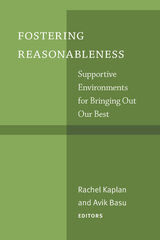


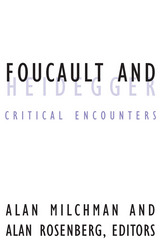

This volume also includes several important works by Foucault previously unpublished in English. The other contributors are Georges Canguilhem, Gilles Deleuze, Jacques Derrida, Pierre Hadot, Michel Serres, and Paul Veyne.
Here for the first time is the French Foucault.
This volume offers lucid and important texts that will appeal to students and professors at every level of study. It is essential reading for all scholars of twentieth-century philosophy and critical theory.

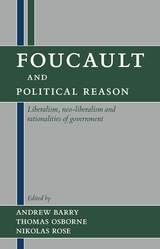
These twelve essays provide a critical introduction to Foucault's work on politics, exploring its relevance to past and current thinking about liberal and neo-liberal forms of government. Moving away from the great texts of liberal political philosophy, this book looks closely at the technical means with which the ideals of liberal political rationalities have been put into practice in such areas as schools, welfare, and the insurance industry.
This fresh approach to one of the seminal thinkers of the twentieth century is essential reading for anyone interested in social and cultural theory, sociology, and politics.

“[A]n important, prescient, and necessary contribution…a kind of litmus test for the efficacy of Foucault’s concepts in the study of disability, concepts that lead to a refusal of the biological essentialism implied in the disability/impairment binary.”
—Foucault Studies
“Tremain has done an exceptional job at organizing and procuring important, rigorously argued, and entertaining essays…. This book should be a mandatory read for anyone interested in contemporary philosophical debates surrounding the experience of disability."
—Essays in Philosophy
“A beautiful exploration of how Foucault’s analytics of power and genealogies of discursive knowledges can open up new avenues for thinking critically about phenomena that many of us take to be inevitable and thus new ways of resisting and possibly at times redirecting the forces that shape our lives. Every scholar, every person with an interest in Foucault or in political theory generally, needs to read this book.”
—Ladelle McWhorter, University of Richmond

In this important and controversial account, Janet Afary and Kevin B. Anderson illuminate Foucault's support of the Islamist movement. They also show how Foucault's experiences in Iran contributed to a turning point in his thought, influencing his ideas on the Enlightenment, homosexuality, and his search for political spirituality. Foucault and the Iranian Revolution informs current discussion on the divisions that have reemerged among Western intellectuals over the response to radical Islamism after September 11. Foucault's provocative writings are thus essential for understanding the history and the future of the West's relationship with Iran and, more generally, to political Islam. In their examination of these journalistic pieces, Afary and Anderson offer a surprising glimpse into the mind of a celebrated thinker.
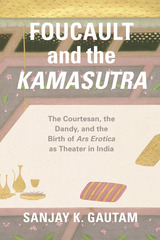
Gautam shows how closely intertwined the history of erotics in Indian culture is with the history of theater-aesthetics grounded in the discourse of love, and Foucault provides the framework for opening up an intellectual horizon of Indian thought. To do this, Gautam looks to the history of three inglorious characters in classical India: the courtesan and her two closest male companions—her patron, the dandy consort; and her teacher and advisor, the dandy guru. Foucault’s distinction between erotic arts and the science of sexuality drives Gautam’s exploration of the courtesan as a symbol of both sexual-erotic and aesthetic pleasure. In the end, by entwining together Foucault’s works on the history of sexuality in the West and the classical Indian texts on eros, Gautam transforms our understanding of both, even as he opens up new ways of investigating erotics, aesthetics, gender relations, and subjectivity.
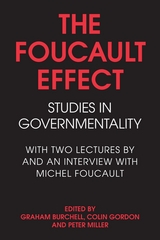
Foucault's thoughts on political discourse and governmentality are supplemented by the essays of internationally renowned scholars. United by the common influence of Foucault's approach, they explore the many modern manifestations of government: the reason of state, police, liberalism, security, social economy, insurance, solidarity, welfare, risk management, and more. The central theme is that the object and the activity of government are not instinctive and natural things, but things that have been invented and learned.
The Foucault Effect analyzes the thought behind practices of government and argues that criticism represents a true force for change in attitudes and actions, and that extending the limits of some practices allows the invention of others. This unique and extraordinarily useful collection of articles and primary materials will open the way for a whole new set of discussions of the work of Michel Foucault as well as the status of liberalism, social policy, and insurance.

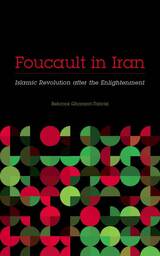
Were the thirteen essays Michel Foucault wrote in 1978–1979 endorsing the Iranian Revolution an aberration of his earlier work or an inevitable pitfall of his stance on Enlightenment rationality, as critics have long alleged? Behrooz Ghamari-Tabrizi argues that the critics are wrong. He declares that Foucault recognized that Iranians were at a threshold and were considering if it were possible to think of dignity, justice, and liberty outside the cognitive maps and principles of the European Enlightenment.
Foucault in Iran centers not only on the significance of the great thinker’s writings on the revolution but also on the profound mark the event left on his later lectures on ethics, spirituality, and fearless speech. Contemporary events since 9/11, the War on Terror, and the Arab Uprisings have made Foucault’s essays on the Iranian Revolution more relevant than ever. Ghamari-Tabrizi illustrates how Foucault saw in the revolution an instance of his antiteleological philosophy: here was an event that did not fit into the normative progressive discourses of history. What attracted him to the Iranian Revolution was precisely its ambiguity.
Theoretically sophisticated and empirically rich, this interdisciplinary work will spark a lively debate in its insistence that what informed Foucault’s writing was not an effort to understand Islamism but, rather, his conviction that Enlightenment rationality has not closed the gate of unknown possibilities for human societies.

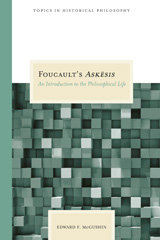
Through a detailed study of Foucault's last courses, McGushin demonstrates that this new way of practicing philosophical askēsis evokes Foucault's ethical resistance to modern relations of power and knowledge. In order to understand Foucault's later project, then, it is necessary to see it within the context of his earlier work. If his earlier projects represented an attempt to bring to light the relations of power and knowledge that narrowed and limited freedom, then this last project represents his effort to take back that freedom by redefining it in terms of care of the self. Foucault always stressed that modern power functions by producing individual subjects. This book shows how his excavation of ancient philosophical practices gave him the tools to counter this function-with a practice of self-formation, an askēsis.
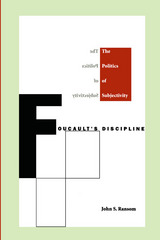
Foucault’s Discipline demonstrates how Foucault’s valorization of descriptive critique over prescriptive plans of action can be applied to the decisively altered political landscape of the end of this millennium. By reconstructing the philosopher’s arguments concerning the significance of disciplinary institutions, biopower, subjectivity, and forms of resistance in modern society, Ransom shows how Foucault has provided a different way of looking at and responding to contemporary models of government—in short, a new depiction of the political world.

Table of Contents:
Introduction
Part One: The Perceptual Revolution or the Sense of Smell on Trial
1. Air and the Threat of the Putrid
2. The Extremes of Olfactory Vigilance
3. Social Emanations
4. Redefining the Intolerable
5. The New Calculus of Olfactory Pleasure
Part Two: Purifying Public Space
6. The Tactics of Deodorization
7. Odors and the Physiology of the Social Order
8. Policy and Pollution
Part Three: Smells, Symbols, and Social Representations
9. The Stench of the Poor
10. Domestic Atmospheres
11. The Perfumes of Intimacy
12. The Intoxicating Flask
13. "Laughter in a Bead of Sweat"
14. The Odors of Paris
Conclusion
Notes
Index
Reviews of this book:
[This book] is not only serious, but interesting and important; one of those studies that profoundly alters our understanding of both social life and history.
--Joan W. Scott, New York Times Book Review
Reviews of this book:
At once encyclopedic and impressionistic, The Foul and the Fragrant is...a masterful exposition of odors and the perception of odors from 1750 to the "Pasteurian revolution" of the late nineteenth century...It is an important and, at times, fascinating voyage...Exploring with imagination and audacity the changing role of smell in the anxieties and antagonisms of the modern world, Corbin reminds us that social history, too long sanitized and too often abstract, must make room for the senses.
--Michael Burns, Los Angeles Times Book Review
Reviews of this book:
The story has never been told more brilliantly, nor with such verve and perceptiveness. That alone would make Corbin's book worth reading, but one may read it as well for a deeper understanding of the roots of modern urban anxieties about the unwholesome...Corbin's book is a tour de force.
--Simon Schama, New Republic
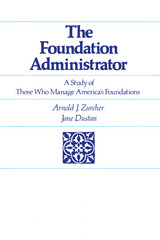

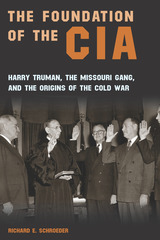
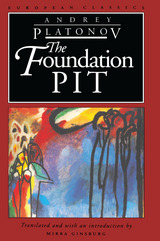
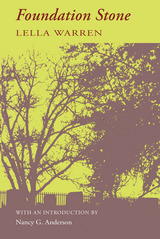
Using the history of Alabama and the stories of her pioneering ancestors, Lella Warren created the Whetstone clan who settled Alabama in the 1820s, helped lead it into the prosperity of the 1850s, and fought for it in the War Between the States. The historical background of Foundation Stone is authentic, but, more, it is a compelling story about believable characters. The story of these people—three generations of Whetstones—captures the American pioneering spirit. As an unidentified reviewer described the novel, “Lella Warren’s ‘Foundation Stone’ is the long, well-told chronicle of a family that loved and hoped and struggled in a difficult world, unaware that they symbolized an era and a way of life.” Foundation Stone was published in September 1940 and was on the Publishers Weekly bestseller list September 1940-February 1941, along with Hemingway’s For Whom the Bell Tolls and Wolfe’s You Can’t Go Home Again.
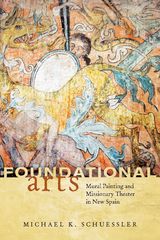
In Foundational Arts Michael K. Schuessler asserts that the literature of New Spain begins with missionary theater and its intimate relationship to mural painting. In particular, he examines the relationships between texts and visual images that emerged in Mexico at two Augustinian monasteries in Hidalgo, Mexico, during the century following the Spanish Conquest. The forced combination of the ideographical tradition of Nahuatl with Latin-based language alphabets led to a fascinating array of new cultural expressions.
Missionary theater was organized by ingenious friars with the intent to convert and catechize indigenous populations. Often performed in Nahuatl or other local languages, the actors combined Latin-based language texts with visual contexts that corresponded to indigenous ways of knowing: murals, architectural ornamentation, statuary, altars, and other modes of visual representation. By concentrating on the interrelationship between mural painting and missionary theater, Foundational Arts explores the artistic and ideological origins of Mexican plastic arts and literature.
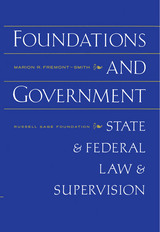
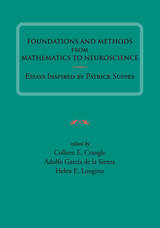
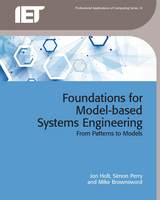
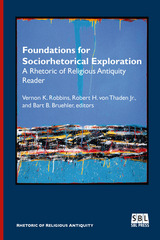
Engaging resources for understanding the importance of bodies and spaces in producing and interpreting persuasive language
This volume collects essays that represent intellectual milestones that are informing sociorhetorical interpretation during the twenty-first century. The essays are arranged into five parts: (1) Topos; (2) Cultural Geography and Critical Spatiality; (3) Rhetorolects and Conceptual Blending; (4) Rhetography; and (5) Rhetorical Force.
Features:
- Tools for integrating multiple approaches to biblical interpretation
- Resources that emphasize the importance of language that prompts mental pictures in effective rhetoric
- Essays from classicists, rhetoricians, and biblical scholars
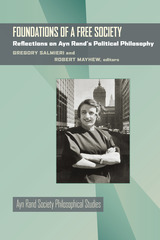
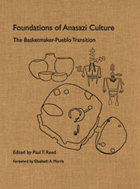
This major synthesis of work explores new evidence gathered at Basketmaker III sites on the Colorado Plateau in search of further understanding of Anasazi development.
Since the 1960s, large-scale cultural resource management projects have revealed the former presence of Anasazi within the entire northern Southwest. These discoveries have resulted in a greatly expanded view of the BMIII period (A.D. 550-750) which immediately proceeds the Pueblo phase. Particularly noteworthy are finding of Basketmaker remains under those of later periods and in sites with open settings, as opposed to the more classic Basketmaker cave and rock shelter sites.
Foundations of Anasazi Culture explores this new evidence in search of further understanding of Anasazi development. Several chapters address the BMII-BMIII transition, including the initial production and use of pottery, greater reliance on agriculture, and the construction of increasingly elaborate structures. Other chapters move beyond the transitional period to discuss key elements of the Anasazi lifestyle, including the use of gray-,red-, and white-ware ceramics, pit structures, storage cists, surface rooms, full dependence on agriculture, and varying degrees of social specialization and differentiation. A number of contributions address one or more of these issues as they occur at specific sites. Other contributors consider the material culture of the period in terms of common elements in architecture, ceramics, lithic technology, and decorative media.
This work on BMIII sites on the Colorado Plateau will be useful to anyone with an interest in the earliest days of Anasazi civilization.

The papers are divided into six sections, each introduced by prominent researchers. Sections one and two cover the origins and history of the field and the emergence of basic methods and approaches. They provide a background for sections three through six, which focus on development and learning; neural and hormonal mechanisms of behavior; sensory processes, orientation, and communication; and the evolution of behavior.
This outstanding collection will serve as the basis for undergraduate and graduate seminars and as a reference for researchers in animal behavior, whether they focus on ethology, behavioral ecology, comparative psychology, or anthropology.
Published in association with the Animal Behavior Society

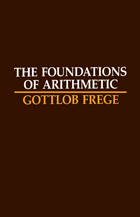
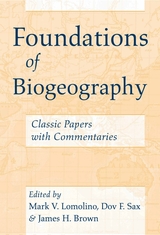
List of Contributors
John C. Briggs, James H. Brown, Vicki A. Funk, Paul S. Giller, Nicholas J. Gotelli, Lawrence R. Heaney, Robert Hengeveld, Christopher J. Humphries, Mark V. Lomolino, Alan A. Myers, Brett R. Riddle, Dov F. Sax, Geerat J. Vermeij, Robert J. Whittaker



adaptive management approaches to ecosystem and resource management.

The papers span nearly nine decades of ecological research, from 1887 on, and are organized in six sections: foundational papers, theoretical advances, synthetic statements, methodological developments, field studies, and ecological experiments. Selections range from Connell's elegant account of experiments with barnacles to Watt's encyclopedic natural history, from a visionary exposition by Grinnell of the concept of niche to a seminal essay by Hutchinson on diversity.
Six original essays by contemporary ecologists and a historian of ecology place the selections in context and discuss their continued relevance to current research. This combination of classic papers and fresh commentaries makes Foundations of Ecology both a convenient reference to papers often cited today and an essential guide to the intellectual and conceptual roots of the field.
Published with the Ecological Society of America.
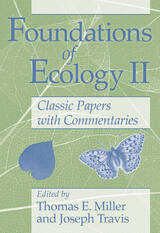
The period of 1970 to 1995 was a time of tremendous change in all areas of ecology—from an increased rigor for experimental design and analysis to the reevaluation of paradigms, new models for understanding, and theoretical advances. Edited by ecologists Thomas E. Miller and Joseph Travis, Foundations of Ecology II includes facsimiles of forty-six papers from this period alongside expert commentaries that discuss a total of fifty-three key studies, addressing topics of diversity, predation, complexity, competition, coexistence, extinction, productivity, resources, distribution, abundance, and conservation. The result is more than a catalog of historic firsts; this book offers diverse perspectives on the foundational papers that led to today’s ecological work. Like this book’s 1991 predecessor, Foundations of Ecology edited by Leslie A. Real and James H. Brown, Foundations of Ecology II promises to be the essential primer for graduate students and practicing ecologists for decades to come.


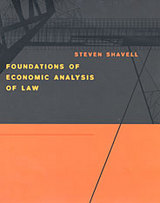
What effects do laws have? Do individuals drive more cautiously, clear ice from sidewalks more diligently, and commit fewer crimes because of the threat of legal sanctions? Do corporations pollute less, market safer products, and obey contracts to avoid suit? And given the effects of laws, which are socially best? Such questions about the influence and desirability of laws have been investigated by legal scholars and economists in a new, rigorous, and systematic manner since the 1970s. Their approach, which is called economic, is widely considered to be intellectually compelling and to have revolutionized thinking about the law.
In this book Steven Shavell provides an in-depth analysis and synthesis of the economic approach to the building blocks of our legal system, namely, property law, tort law, contract law, and criminal law. He also examines the litigation process as well as welfare economics and morality. Aimed at a broad audience, this book requires neither a legal background nor technical economics or mathematics to understand it. Because of its breadth, analytical clarity, and general accessibility, it is likely to serve as a definitive work in the economic analysis of law.

Throughout its chapters, the text asks students to apply key concepts to current data (which they are required to locate using the Internet and other sources) to get a clearer picture of the most pressing issues in environmental science. The text begins by exploring how changes in world population impact all aspects of the environment, particularly with respect to energy use. It then discusses what the first and second laws of thermodynamics tell us about renewable and nonrenewable energy; how current energy use is changing the global climate; and how alternative technologies can be evaluated through scientific risk assessment. In approaching real-world problems, students come to understand the physical principles that underlie scientific findings.
This informative and engaging textbook offers what prospective scientists, managers, and policymakers need most: the knowledge to understand environmental threats and the skills to find solutions.

2024 Southwest Book of the Year, Pima County Public Library
A history of how the construction of the Glen Canyon Dam was built and sustained by social inequalities
The second highest concrete-arch dam in the United States, Glen Canyon Dam was built to control the flow of the Colorado River throughout the Western United States. Completed in 1966, the dam continues to serve as a water storage facility for residents, industries, and agricultural use across the American West. The dam also generates hydroelectric power for residents in Colorado, Wyoming, New Mexico, Utah, Nevada, Arizona, and Nebraska. More than a massive piece of physical infrastructure and an engineering feat, the dam exposes the cultural structures and complex regional power relations that relied on Indigenous knowledge and labor while simultaneously dispossessing the Indigenous communities of their land and resources across the Colorado Plateau.
Erika Marie Bsumek reorients the story of the dam to reveal a pattern of Indigenous erasure by weaving together the stories of religious settlers and Indigenous peoples, engineers and biologists, and politicians and spiritual leaders. Infrastructures of dispossession teach us that we cannot tell the stories of religious colonization, scientific exploration, regional engineering, environmental transformation, or political deal-making as disconnected from Indigenous history. This book is a provocative and essential piece of modern history, particularly as water in the West becomes increasingly scarce and fights over access to it continue to unfold.
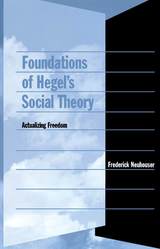
The author's purpose is to understand the philosophical foundations of Hegel's social theory by articulating the normative standards at work in his claim that the three central social institutions of the modern era--the nuclear family, civil society, and the constitutional state--are rational or good. Its central question is: what, for Hegel, makes a rational social order rational? In addressing this question the book aspires to be faithful to Hegel's texts and to articulate a compelling theory of rational social institutions; its aim is not only to interpret Hegel correctly but also to demonstrate the richness and power that his vision of the rational social order possesses.
Frederick Neuhouser's task is to understand the conceptions of freedom on which Hegel's theory rests and to show how they ground his arguments in defense of the modern social world. In doing so, the author focuses on Hegel's most important and least understood contribution to social philosophy, the idea of "social freedom."
Neuhouser's strategy for making sense of social freedom is to show its affinities with Rousseau's conception of the general will. The main idea that Hegel appropriates from Rousseau is that rational social institutions must satisfy two conditions: first, they must furnish the basic social preconditions of their members' freedom; and, second, all social members must be able subjectively to affirm their freedom-conditioning institutions as good and thus to regard the principles that govern their social participation as coming from their own wills.

The most thorough and engaging survey of high-energy astrophysics available today, Foundations of High-Energy Astrophysics introduces the main physical processes relevant to the field in a rigorous yet accessible way, while paying careful attention to observational issues. Vietri’s book will quickly become a classic text for students and active researchers in astronomy and astrophysics. Those in adjoining fields will also find it a valuable addition to their personal libraries.


- discusses information law as part of a continuum of interrelated issues rather than an assortment of discrete topics;
- examines information law in the context of different types of libraries;
- delves into the manifold legal issues raised when interacting with patrons and communities, from intellectual freedom topics like censorship and public activities in the library to the legal issues surrounding materials and information access;
- elucidates operational and management legal issues, including library security, interacting with law enforcement, advocacy, lobbying, funding, human resources, and liability;
- promotes literacy of the law, its structures, and its terminology as a professional skill;
- gives readers the tools to find and understand different sources of legal authority and demonstrates how to interpret them when they conflict; and
- explores information law as a national and cross-national issue.

It’s not hyperbole to conclude that in today’s world, information literacy is essential for survival and success; and also that, if left unchecked, the social consequences of widespread misinformation and information illiteracy will only continue to grow more dire. Thus its study must be at the core of every education. But while many books have been written on information literacy, this text is the first to examine information literacy from a cross-national, cross-cultural, and cross-institutional perspective. From this book, readers will
- learn about information literacy in a wide variety of contexts, including academic and school libraries, public libraries, special libraries, and archives, through research and literature that has previously been siloed in specialized publications;
- come to understand why information literacy is not just an issue of information and technology, but also a broader community and societal issue;
- get an historical overview of advertising, propaganda, disinformation, misinformation, and illiteracy;
- gain knowledge of both applied strategies for working with individuals and for addressing the issues in community contexts;
- find methods for combating urgent societal ills caused and exacerbated by misinformation; and
- get tools and techniques for advocacy, activism, and self-reflection throughout one’s career.

Foreword by Alan S. Inouye; Afterword by Nancy Kranich
The first of its kind, this important new text provides a much-needed introduction to the myriad information policy issues that impact information professionals, information institutions, and the patrons and communities served by those institutions. In this key textbook for LIS students and reference text for practitioners, noted scholars Jaeger and Taylor
- draw from current, authoritative sources to familiarize readers with the history of information policy;
- discuss the broader societal issues shaped by policy, including access to infrastructure, digital literacy and inclusion, accessibility, and security;
- elucidate the specific laws, regulations, and policies that impact information, including net neutrality, filtering, privacy, openness, and much more;
- use case studies from a range of institutions to examine the issues, bolstered by discussion questions that encourage readers to delve more deeply;
- explore the intersections of information policy with human rights, civil rights, and professional ethics; and
- prepare readers to turn their growing understanding of information policy into action, through activism, advocacy, and education.

- the historical and legal roots of intellectual freedom, with an in-depth examination of John Stuart Mill’s “On Liberty” and Article 19 of the U.N Declaration of Human Rights, and its central concepts and principles;
- the intersection of intellectual freedom, freedom of expression, and social justice;
- professional values, codes of ethics, ALA’s Library Bill of Rights, and Freedom to Read/View Statements;
- pro- and anti- censorship arguments and their use in impeding and facilitating access to information;
- book banning and internet filtering;
- privacy and its relationship to information services;
- U.S. case law and precedents;
- the basics of U.S. copyright law, including fair use, and how it differs from international copyright law; and
- emerging global issues and their impact on future intellectual freedom.


Richard E. Rubin’s book has served as the authoritative introductory text for generations of library and information science practitioners, with each new edition taking in its stride the myriad societal, technological, political, and economic changes affecting our users and institutions and transforming our discipline. Rubin teams up with his daughter, Rachel G. Rubin, a rising star in the library field in her own right, for the fifth edition. Spanning all types of libraries, from public to academic, school, and special, it illuminates the major facets of LIS for students as well as current professionals. Continuing its tradition of excellence, this text addresses
- the history and mission of libraries from past to present, including the history of service to African Americans;
- critical contemporary social issues such as services to marginalized communities, tribal libraries, and immigrants;
- the rise of e-government and the crucial role of political advocacy;
- digital devices, social networking, digital publishing, e-books, virtual reality, and other technology;
- forces shaping the future of libraries, including Future Ready libraries, and sustainability as a core value of librarianship;
- the values and ethics of the profession, with new coverage of civic engagement, combatting fake news, the importance of social justice, and the role of critical librarianship;
- knowledge infrastructure and organization, including Resource Description and Access (RDA), linked data, and the Library Research Model;
- the significance of the digital divide and policy issues related to broadband access and net neutrality;
- intellectual freedom, legal issues, and copyright-related topics;
- contemporary issues in LIS education such as the ongoing tensions between information science and library science; and
- the changing character of collections and services including the role of digital libraries, preservation, and the digital humanities.
In its newest edition, Foundations of Library and Information Science remains the field’s essential resource.

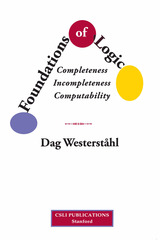
This book provides a concise but detailed account of modern logic's three cornerstones: the completeness of first-order logic, Gödel's Incompleteness Theorems, and Turing's analysis of computability. In addition to the central text, an appendix explains the required technical terminology and facts. The main ideas behind the three cornerstones are explained in a simple, easy-to-grasp manner, and it is possible to select among the chapters and sections so that the reader becomes familiar with these ideas, even if some technicalities are skipped or postponed. A wealth of exercises accompany a wide selection of materials, including the histories and philosophical implications of the three main premises, making it useful as a textbook for undergraduate or graduate courses focusing on any of the three main themes. The material is rigorous and detailed but keeps the main ideas in sight, and there are numerous excursions into more advanced material for curious readers to explore.
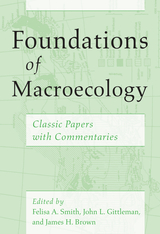
Foundations of Macroecology charts the evolutionary trajectory of these concepts—from the species-area relationship and the latitudinal gradient of species richness to the relationship between body size and metabolic rate—through forty-six landmark papers originally published between 1920 and 1998. Divided into two parts—“Macroecology before Macroecology” and “Dimensions of Macroecology”—the collection also takes the long view, with each paper accompanied by an original commentary from a contemporary expert in the field that places it in a broader context and explains its foundational role. Providing a solid, coherent assessment of the history, current state, and potential future of the field, Foundations of Macroecology will be an essential text for students and teachers of ecology alike.
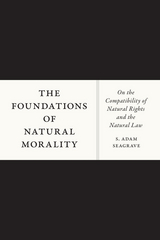
With The Foundations of Natural Morality, S. Adam Seagrave addresses this controversy, offering an entirely new account of natural morality that compellingly unites the concepts of natural law and natural rights. Seagrave agrees with Strauss that the idea of natural rights is distinctly modern and does not derive from traditional natural law. Despite their historical distinctness, however, he argues that the two ideas are profoundly compatible and that the thought of John Locke and Thomas Aquinas provides the key to reconciling the two sides of this long-standing debate. In doing so, he lays out a coherent concept of natural morality that brings together thinkers from Plato and Aristotle to Hobbes and Locke, revealing the insights contained within these disparate accounts as well as their incompleteness when considered in isolation. Finally, he turns to an examination of contemporary issues, including health care, same-sex marriage, and the death penalty, showing how this new account of morality can open up a more fruitful debate.
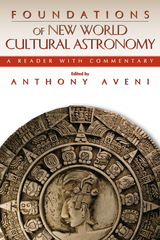
Cultural astronomy, first called archaeoastronomy, has evolved at ferocious speed since its genesis in the 1960s, with seminal essays and powerful rebuttals published in far-flung, specialized journals. Until now, only the most closely involved scholars could follow the intellectual fireworks. In Foundations of New World Cultural Astronomy, Anthony Aveni, one of cultural astronomy's founders and top scholars, offers a selection of the essays that built the field, from foundational works to contemporary scholarship.
Including four decades of research throughout the Americas by linguists, archaeologists, historians, ethnologists, astronomers, and engineers, this reader highlights the evolution of the field through thematic organization and point-counterpoint articles. Aveni - an award-winning author and former National Professor of the Year - serves up incisive commentary, background for the uninitiated, and suggested reading, questions, and essay topics. Students, readers, and scholars will relish this collection and its tour of a new field in which discoveries about ancient ways of looking at the skies cast light on our contemporary views.

In this volume, Michael Jensen and his collaborators present the foundations of an integrated theory of organizations. The theory assumes that organizations are equilibrium systems that, like markets, can be influenced, but cannot be told what to do; that human beings are rational and self-interested for the most part; and that information is costly to produce and transfer among agents. The theory also treats business organizations as entities existing in a system of markets (including financial, product, labor, and materials markets) that must be considered in the formulation of organizational strategy.
Jensen argues that the cost of transferring information makes it necessary to decentralize some decision rights in organizations and in the economy. This decentralization in turn requires organizations to solve the control problem that results when self-interested persons do not behave as perfect agents.
Capitalist economies solve these control problems through the institution of alienable decision rights. But because organizations must suppress the alienability of decision rights, they must devise substitute mechanisms that perform its functions. Jensen argues that three critical systems, which he calls the organizational rules of the game, are necessary to substitute for alienability in organizations: (1) a system for allocating decision rights among agents in the firm, (2) a system for measuring and evaluating performance in the firm, and (3) a system for rewarding and punishing individuals for their performance. These concepts offer a major competitive advantage for organizations.
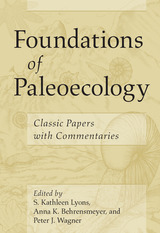
This book brings together forty-four classic papers published between 1924 and 1999 that trace the origins and development of paleoecology. The articles cross taxonomic groups, habitat types, geographic areas, and time and have made substantial contributions to our knowledge of the evolution of life. Encompassing the full breadth of paleoecology, the book is divided into six parts: community and ecosystem dynamics, community reconstruction, diversity dynamics, paleoenvironmental reconstruction, species interaction, and taphonomy. Each paper is also introduced by a contemporary expert who gives context and explains its importance to ongoing paleoecological research. A comprehensive introduction to the field, Foundations of Paleoecology will be an essential reference for new students and established paleoecologists alike.

This is the first primer on financing urban redevelopment written for practicing planners and public administrators. In easy-to-understand language, it will inform readers of the natural cycle of urban development, explain how to overcome barriers to efficient redevelopment, what it takes for the private sector to justify its redevelopment investments, and the role of public and nonprofit sectors to leverage private sector redevelopment where the market does not generate sufficient rates of return.
This is a must read for practicing planners and planning students, economic development officials, public administrators, and others who need to understand how to leverage public and non-profit resources to leverage private funds for redevelopment.


This new edition of Foundations of Restoration Ecology provides the latest emerging theories and ideas in the science of restoration ecology. Fully one-third longer than the first edition and comprehensive in scope, it has been dramatically updated to reflect new research. Included are new sections devoted to concepts critical to all restoration projects as well as restoration of specific ecosystem processes, including hydrology, nutrient dynamics, and carbon. Also new to this edition are case studies that describe real-life restoration scenarios in North and South America, Europe, and Australia. They highlight supporting theory for restoration application and other details important for assessing the degree of success of restoration projects in a variety of contexts. Lists at the end of each chapter summarize new theory introduced in that chapter and its practical application.
Written by acclaimed researchers in the field, this book provides practitioners as well as graduate and undergraduate students with a solid grounding in the newest advances in ecological science and theory.

Each chapter addresses a particular area of ecological theory, covering traditional levels of biological hierarchy (such as population genetics, demography, community ecology) as well as topics of central relevance to the challenges of restoration ecology (such as species interactions, fine-scale heterogeneity, successional trajectories, invasive species ecology, ecophysiology). Several chapters focus on research tools (research design, statistical analysis, modeling), or place restoration ecology research in a larger context (large-scale ecological phenomena, macroecology, climate change and paleoecology, evolutionary ecology).
The book makes a compelling case that a stronger connection between ecological theory and the science of restoration ecology will be mutually beneficial for both fields: restoration ecology benefits from a stronger grounding in basic theory, while ecological theory benefits from the unique opportunities for experimentation in a restoration context.
Foundations of Restoration Ecology advances the science behind the practice of restoring ecosystems while exploring ways in which restoration ecology can inform basic ecological questions. It provides the first comprehensive overview of the theoretical foundations of restoration ecology, and is a must-have volume for anyone involved in restoration research, teaching, or practice.

The Foundations of Science and the Concepts of Psychology and Psychoanalysis was first published in 1956. Minnesota Archive Editions uses digital technology to make long unavailable books once again accessible, and are published unaltered from the original University of Minnesota Press editions.
This first volume of Minnesota Studies in the Philosophy of Science presents some of the relatively more consolidated research of the Minnesota Center for Philosophy of Science. The work of the Center, which was established in 1953 through a grant from the Louis W. and Maud Hill Family Foundation, has so far been devoted largely to the philosophical, logical, and methodological problems of psychology. Some of the twelve papers in this volume are concerned with broad philosophical foundations; others consider specific problems of method or interpretation. The contributors, some of whom are represented in the authorship of more than one paper, are Herbert Feigl, director of the Center; Rudolf Carnap; B.F. Skinner; Michael Scriven; Albert Ellis; Antony Flew; L. J. Cronbach; Paul E. Meehl; R. C. Buck; and Wilfrid Sellars.
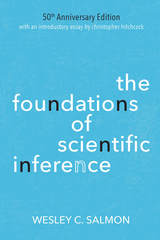
After its publication in 1967, The Foundations of Scientific Inference taught a generation of students and researchers about the problem of induction, the interpretation of probability, and confirmation theory. Fifty years later, Wesley C. Salmon’s book remains one of the clearest introductions to these fundamental problems in the philosophy of science. With The Foundations of Scientific Inference, Salmon presented a coherent vision of the nature of scientific reasoning, explored the philosophical underpinnings of scientific investigation, and introduced readers to key movements in epistemology and to leading philosophers of the twentieth century—such as Karl Popper, Rudolf Carnap, and Hans Reichenbach—offering a critical assessment and developing his own distinctive views on topics that are still of central importance today.
This anniversary edition of Salmon’s foundational work in the philosophy of science features a detailed introduction by Christopher Hitchcock, which examines the book’s origins, influences, and major themes, its impact and enduring effects, the disputes it raised, and its place in current studies, revisiting Salmon’s ideas for a new audience of philosophers, historians, scientists, and students.

Combining principles of individual rational choice with a sociological conception of collective action, James Coleman recasts social theory in a bold new way. The result is a landmark in sociological theory, capable of describing both stability and change in social systems.
This book provides for the first time a sound theoretical foundation for linking the behavior of individuals to organizational behavior and then to society as a whole. The power of the theory is especially apparent when Coleman analyzes corporate actors, such as large corporations and trade unions. He examines the creation of these institutions, collective decision making, and the processes through which authority is revoked in revolts and revolutions.
Coleman discusses the problems of holding institutions responsible for their actions as well as their incompatibility with the family. He also provides a simple mathematical analysis corresponding to and carrying further the verbal formulations of the theory. Finally, he generates research techniques that will permit quantitative testing of the theory.
From a simple, unified conceptual structure Coleman derives, through elegant chains of reasoning, an encompassing theory of society. It promises to be the most important contribution to social theory since the publication of Talcott Parsons' Structure of Social Action in 1936.

Foundations of Space-Time Theories was first published in 1977. Minnesota Archive Editions uses digital technology to make long-unavailable books once again accessible, and are published unaltered from the original University of Minnesota Press editions.
The essays in this volume are based on the papers given at a conference on the philosophical aspects of the space-time theory held under the auspices of the Minnesota Center for Philosophy of Science.

The study of streams and rivers combines ecology, chemistry, hydrology, and geology to reveal factors that control the biological diversity and functioning of these unique ecosystems. Although stream ecology is a relatively young discipline, foundational papers published over the past half-century have shaped our current understanding of these ecosystems and have informed our efforts to manage and protect them. Organized thematically, each chapter of this book—on topics including the physical template, communities, food webs, ecosystem energetics, and nutrient dynamics—offers summaries of the key literature, history and context on the topic, and forward-looking discussions that examine how past research has influenced current studies and may shape future efforts.
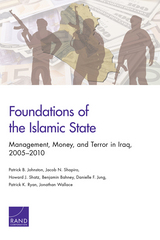

In the wake of Jean Piaget’s work on children’s understanding of reality, it is generally accepted that by age two, children assume that an object hidden in a box will remain there unchanged until someone tampers with it. Eugene Subbotsky persuasively demonstrates that many children—and some adults—will often accept mysterious disappearances and creations, perceiving them not as tricks or illusions but as actual occurrences. His analysis clearly shows that alongside our everyday belief in object permanence, we also have a set of quasi-magical beliefs that can be activated by appropriate situations and behaviors. The acceptability of these beliefs will vary from culture to culture, and will be widespread among preliterate peoples but less obvious in advanced industrial countries. The author, a Russian psychologist, draws on his own extensive research and examines other taken-for-granted concepts, such as the distinction between animate and inanimate.
Foundations of the Mind, amply illustrated with experimental material, has enormous implications for the study of both child development and the psychology of human beliefs. It attacks our complacent and often culturally biased faith in the nature of reality, and as such will become required reading for all psychologists.

Foundations of the Portuguese Empire, 1415-1580 was first published in 1977. Minnesota Archive Editions uses digital technology to make long-unavailable books once again accessible, and are published unaltered from the original University of Minnesota Press editions.
This account traces the history of the Portuguese overseas discoveries, following the expansion into the Atlantic island, the Madeiras, and the Azores. It continues the account with the history of Portuguese discoveries along the African coast, at Guinea, the Congo, and Good Hope, then follows the voyages of Vasco da Gama to India and to Cabra, Brazil, and the expansion in the early years of the sixteen century to Malacca, China, and the East Indies. The volume presents not only a useful narrative of the spread of Portuguese empire but also new interpretations and analyses of the Portuguese overseas history.



Foundations of Tropical Forest Biology makes essential works in the development of tropical biology available in a convenient form to both senior scholars interested in the roots of their discipline and to students encountering the field for the first time, as well as to everyone concerned with tropical conservation.

Although both the League of Nations and the Permanent Court of International Justice were rejected by the U.S. Senate, Boyle shows how the early governance of these institutions—precursors, respectively, to the United Nations and the International Court of Justice—informed later efforts to reduce and regulate transnational threats and the use of military force. Delving into such topics as the United States and its initial stance of neutrality in World War I and its imperial policy toward Latin America and the Caribbean, Boyle offers detailed readings of the relevant treaties, tribunals, and conferences, and assesses the political actors involved. Taking up the legalist point of view, he discusses the codification of customary international law, the obligatory arbitration of international disputes, and the creation of a new regime for the settlement of such disputes.
Boyle has provided in Foundations of World Order a compelling portrait of the relationship between political power and law, and of the impact of these forces on U.S. diplomacy. This volume will serve as a valuable resource to students, scholars, and practitioners of international law; it will also be of great interest to historians and political scientists engaged with issues of U.S. foreign policy and diplomatic history.
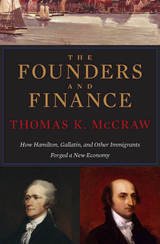
In 1776 the United States government started out on a shoestring and quickly went bankrupt fighting its War of Independence against Britain. At the war’s end, the national government owed tremendous sums to foreign creditors and its own citizens. But lacking the power to tax, it had no means to repay them. The Founders and Finance is the first book to tell the story of how foreign-born financial specialists—immigrants—solved the fiscal crisis and set the United States on a path to long-term economic success.
Pulitzer Prize–winning author Thomas K. McCraw analyzes the skills and worldliness of Alexander Hamilton (from the Danish Virgin Islands), Albert Gallatin (from the Republic of Geneva), and other immigrant founders who guided the nation to prosperity. Their expertise with liquid capital far exceeded that of native-born plantation owners Washington, Jefferson, and Madison, who well understood the management of land and slaves but had only a vague knowledge of financial instruments—currencies, stocks, and bonds. The very rootlessness of America’s immigrant leaders gave them a better understanding of money, credit, and banks, and the way each could be made to serve the public good.
The remarkable financial innovations designed by Hamilton, Gallatin, and other immigrants enabled the United States to control its debts, to pay for the Louisiana Purchase of 1803, and—barely—to fight the War of 1812, which preserved the nation’s hard-won independence from Britain.
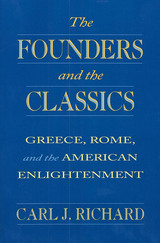
Is our Greek and Roman heritage merely allusive and illusory? Or were our founders, and so our republican beginnings, truly steeped in the stuff of antiquity? So far largely a matter of generalization and speculation, the influence of Greek and Roman authors on our American forefathers finally becomes clear in this fascinating book-the first comprehensive study of the founders’ classical reading.
Carl J. Richard begins by examining how eighteenth-century social institutions in general and the educational system in particular conditioned the founders to venerate the classics. He then explores the founders’ various uses of classical symbolism, models, “antimodels,” mixed government theory, pastoralism, and philosophy, revealing in detail the formative influence exerted by the classics, both directly and through the mediation of Whig and American perspectives. In this analysis, we see how the classics not only supplied the principal basis for the U.S. Constitution but also contributed to the founders’ conception of human nature, their understanding of virtue, and their sense of identity and purpose within a grand universal scheme. At the same time, we learn how the classics inspired obsessive fear of conspiracies against liberty, which poisoned relations between Federalists and Republicans.
The shrewd ancients who molded Western civilization still have much to teach us, Richard suggests. His account of the critical role they played in shaping our nation and our lives provides a valuable lesson in the transcendent power of the classics.
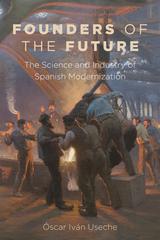

Viewed alternately as an obstacle to justice, an impediment to efficient government, and a tool by which some groups gain benefits and privileges at the expense of others, public administration threatens to become the whipping boy of American government. In this innovative look at the nation's bureaucracy, Michael W. Spicer revisits the values of the Constitution in order to reconcile the administrative state to its many critics.
Drawing on political and social philosophy, Spicer argues that there is a fundamental philosophical conflict over the role of reason in society between writers in public administration and the designers of the American Constitution. This examination of worldviews illuminates the problem that American government faces in trying to ground a legitimate public administration in the Constitution. Defending and developing the Founders' idea that political power, whatever its source, must be checked, he critically examines existing ideas about the role of public administration in American governance and offers an alternative vision of public administration more in line with the Founders' constitutional design. This book will provide fresh insights for anyone interested in the role of public administration in the United States today.
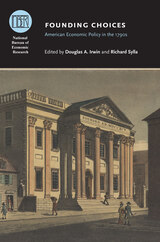
The political decisions made by the founding fathers were crucial to the success of the early republic. But the economic decisions they made were just as pivotal, ensuring the general welfare and common defense of the United States for decades to come. Founding Choices explores these economic choices and their profound influence on American life, westward expansion, and influence abroad. Among the topics covered are finance, trade, and monetary and banking policy, with a focus on the factors guiding those policies and their end result.
This book redresses the relative neglect of the economic achievements of the founders. It will be essential reading for historians and economists alike.
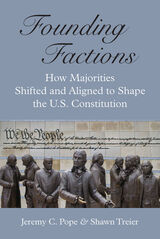
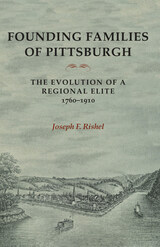
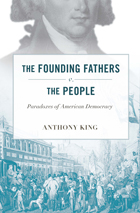
As pundits and politicians remind us at every election cycle or turn of the television dial, the United States sees itself as the world’s greatest democracy. But what citizens might also hear, if they knew how to listen, is the grinding of two tectonic plates on which this democracy was established. In the venerable tradition of keen foreign observers of American politics, Anthony King exposes the political paradoxes in our system that we may well be too close to see—founding principles of our great democracy that are distinctly undemocratic.
In an extended essay eloquent in its plainspoken good sense, King begins, on the one hand, with the founding fathers who emphasized moderation, deliberation, checks and balances, and the separation of powers—a system in which “the people” were allowed to play only a limited role. On the other hand were radical democrats who insisted that the people, and only the people, should rule. The result was a political system tangled up in conflicts that persist to this day: unelected and unaccountable Supreme Court justices who exercise enormous personal power; severe restrictions on the kind of person the people can elect as president; popular referendums at the state and local level but none at the federal level, not even to ratify amendments to the Constitution.
In King’s provocative analysis, we see how these puzzles play out in the turmoil of our nation’s public life and political culture—and we glimpse, perhaps, a new way to address them.

Founding Fictions develops the concept of a “political fiction,” or a narrative that people tell about their own political theories, and analyzes how republican and democratic fictions positioned American citizens as either romantic heroes, tragic victims, or ironic partisans. By re-telling the stories that Americans have told themselves about citizenship, Mercieca highlights an important contradiction in American political theory and practice: that national stability and active citizen participation are perceived as fundamentally at odds.
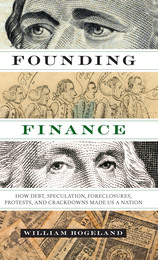
Recent movements such as the Tea Party and anti-tax “constitutional conservatism” lay claim to the finance and taxation ideas of America’s founders, but how much do we really know about the dramatic clashes over finance and economics that marked the founding of America? Dissenting from both right-wing claims and certain liberal preconceptions, Founding Finance brings to life the violent conflicts over economics, class, and finance that played directly, and in many ways ironically, into the hardball politics of forming the nation and ratifying the Constitution—conflicts that still continue to affect our politics, legislation, and debate today.
Mixing lively narrative with fresh views of America’s founders, William Hogeland offers a new perspective on America’s economic infancy: foreclosure crises that make our current one look mild; investment bubbles in land and securities that drove rich men to high-risk borrowing and mad displays of ostentation before dropping them into debtors’ prisons; depressions longer and deeper than the great one of the twentieth century; crony mercantilism, war profiteering, and government corruption that undermine any nostalgia for a virtuous early republic; and predatory lending of scarce cash at exorbitant, unregulated rates, which forced people into bankruptcy, landlessness, and working in the factories and on the commercial farms of their creditors. This story exposes and corrects a perpetual historical denial—by movements across the political spectrum—of America’s all-important founding economic clashes, a denial that weakens and cheapens public discourse on American finance just when we need it most.
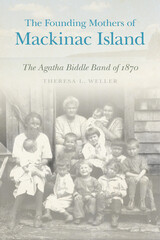
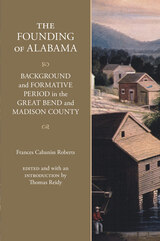
The 1956 dissertation by Frances Cabaniss Roberts is a classic text on Alabama history that continues to be cited by southern historians. Roberts was the first woman to earn a PhD from the University of Alabama’s history department. In the 1950s, she was the only full-time faculty member at what is now the University of Alabama in Huntsville, where she was appointed chair of the history department in 1966.
Roberts’s dissertation, “Background and Formative Period in the Great Bend and Madison County,” remains the most thorough history of the region yet produced. While certainly a product of its era, Roberts work is visionary in its own way and offers a useful look at Alabama’s rise to statehood. Thomas Reidy, editor of this edition, has kept Roberts’s words intact except for correction of minor typographical errors and helpful additions to the notes and citations. His introduction describes both the value of Roberts’s decades of service to UAH and the importance of her dissertation over time. While highlighting the great intrinsic value of Roberts’s research and writing, Reidy also notes its significance in demonstrating how the practice of history—its methods, priorities, and values—has evolved over the intervening decades.
In her examination of Madison County, Roberts spotlights exemplars of civic performance and good community behavior, giving readers one of the earliest accountings of the antebellum southern middle class. Unlike many historians of her time, Roberts displays an interest in both the “common folks” and leaders who built the region—rural and urban—and created the institutions that shaped Madison County. She examines the contributions of merchants, shopkeepers, lawyers, doctors, architects, craftsmen, planters, farmers, elected and appointed officials, board members, and entrepreneurs.


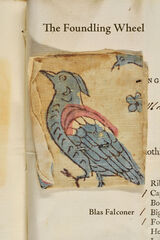
READERS
Browse our collection.
PUBLISHERS
See BiblioVault's publisher services.
STUDENT SERVICES
Files for college accessibility offices.
UChicago Accessibility Resources
home | accessibility | search | about | contact us
BiblioVault ® 2001 - 2024
The University of Chicago Press









